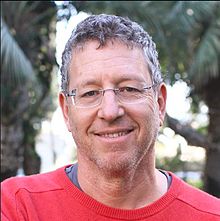Ehud Shapiro
| Ehud Shapiro | |
|---|---|
 |
|
| Born | 1955 Israel |
| Nationality | Israeli |
| Institutions | Weizmann Institute of Science |
| Alma mater | Yale |
| Doctoral students | Aviv Regev, Yaakov Benenson, Tom Ran, Tuval Ben Yehezkel |
Ehud Shapiro (Hebrew: אהוד שפירא; born 1955) is a multi-disciplinary scientist, artist, entrepreneur and a Professor of Computer Science and Biology at the Weizmann Institute of Science. With international reputation, he made fundamental contributions to many scientific disciplines. Ehud was also an Internet pioneer, a successful Internet entrepreneur, and a pioneer and proponent of E-democracy. Ehud is the founder of the Ba Rock Band and conceived its original artistic program. He is a winner of two ERC (European Research Council) Advanced Grants.
Born in Jerusalem in 1955, the guiding light for Ehud Shapiro's scientific endeavors was the philosophy of science of Karl Popper, with which he became acquainted through a high-school project supervised by Moshe Kroy from the Department of Philosophy, Tel Aviv University. In 1979 Shaprio completed his undergraduate studies in Tel Aviv University in Mathematics and Philosophy with distinction. Shapiro's PhD work with Dana Angluin in Computer Science at Yale university attempted to provide an algorithmic interpretation to Popper's philosophical approach to scientific discovery, resulting in both a computer system for the inference of logical theories from facts and a methodology for program debugging, developed using the programming language Prolog. His thesis, "Algorithmic Program Debugging", was published by MIT Press as a 1982 ACM Distinguished Dissertation, followed in 1986 by "The Art of Prolog", a textbook co-authored with Leon Sterling.
Coming to the Department of Computer Science and Applied Mathematics at the Weizmann Institute of Science in 1982 as a post-doctoral fellow, Shapiro was inspired by the Japanese Fifth Generation Computer Systems project to invent a high-level programming language for parallel and distributed computer systems, named Concurrent Prolog. A two-volume book on Concurrent Prolog and related work was published by MIT Press in 1987. Shapiro's work had a decisive influence on the strategic direction of the Japanese national project, and he cooperated closely with the project throughout its 10-years duration.
...
Wikipedia
